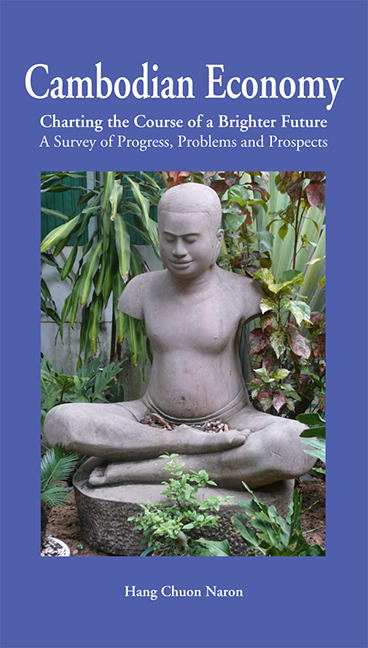 Cambodian Economy
Cambodian Economy Book contents
- Frontmatter
- Contents
- Foreword
- Preface
- INTRODUCTION
- Symbols and abbreviations
- PART I GEOGRAPHY AND POPULATION
- PART II MACROECONOMIC FRAMEWORK
- PART III THE CHALLENGE OF MODERNIZING AGRICULTURE
- PART IV THE CHALLENGE OF INDUSTRIALIZATION
- PART V SERVICES AND INFRASTRUCTURE
- PART VI HUMAN RESOURCE DEVELOPMENT
- PART VII PUBLIC FINANCE
- PART VIII INTERNATIONAL ECONOMIC RELATIONS
- Chapter 22 Foreign Trade
- Chapter 23 External Debt
- Chapter 24 Regional Integration
- PART IX CONCLUSION
- Bibliography
- About the author
Chapter 22 - Foreign Trade
from PART VIII - INTERNATIONAL ECONOMIC RELATIONS
Published online by Cambridge University Press: 21 October 2015
- Frontmatter
- Contents
- Foreword
- Preface
- INTRODUCTION
- Symbols and abbreviations
- PART I GEOGRAPHY AND POPULATION
- PART II MACROECONOMIC FRAMEWORK
- PART III THE CHALLENGE OF MODERNIZING AGRICULTURE
- PART IV THE CHALLENGE OF INDUSTRIALIZATION
- PART V SERVICES AND INFRASTRUCTURE
- PART VI HUMAN RESOURCE DEVELOPMENT
- PART VII PUBLIC FINANCE
- PART VIII INTERNATIONAL ECONOMIC RELATIONS
- Chapter 22 Foreign Trade
- Chapter 23 External Debt
- Chapter 24 Regional Integration
- PART IX CONCLUSION
- Bibliography
- About the author
Summary
Trade Liberalization in Cambodia
The principal goal of Cambodia's foreign economic policy is to expand and strengthen economic ties and international cooperation through the integration of the Cambodian economy into the regional and world economy. This goal is designed to utilize the advantages of international division of labor to promote economic development and improve the welfare of the population.
Since the late 1980s and especially in the early 1990s Cambodia has embarked on trade liberalization and integration. The private sector was enabled to establish trading companies with a maximum foreign participation of 49 percent. Since 1993, the general licensing for most goods has been eliminated when registered companies undertake such trade.
22.1.1. The Role of Tariff
There are several arguments in favor of tariffs:
• to maximize benefits from strategic application of tariffs. Tariffs could increase a country's welfare by enabling excess profits to be shifted from foreign to domestic firms;
• as instruments for temporary protection of a specific “infant” industry. It is argued that certain industries are initially uneconomic but they may become competitive (at world price) in the long run because costs may decrease over time through learning-by-doing effects;
• to raise budget revenue. Trade taxes however are not optimal instruments for achieving a revenue objective because they distort production and consumption choices. Preferred instruments for raising revenue are taxes such as income taxes or commodity taxes (excise taxes, VAT), which are applied neutrally to domestically produced and imported goods;
• to reduce imports as a remedy for balance of payment problems.
22.1.2. The Advantages of Uniform Tariffs
The advantages of a uniform tariff is as follows:
• Administrative convenience. If tariff is uniform, there is no incentive to misclassify goods. This enables customs authorities to concentrate on ensuring that the value of the imported goods is not understated and could reduce to corruption related to customs clearing. Thus, it will lower the administrative costs of trading.[…]
- Type
- Chapter
- Information
- Cambodian EconomyCharting the Course of a Brighter Future - A Survey of Progress, Problems and Prospects, pp. 461 - 484Publisher: ISEAS–Yusof Ishak InstitutePrint publication year: 2012


